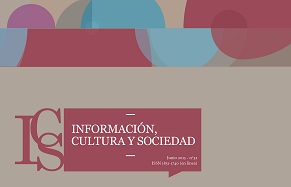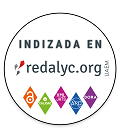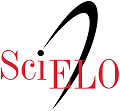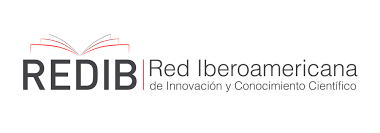The training of readers for the ethical use of information
Abstract
In today's society, the abundance of information and the times in which school tasks and academic or work productivity demands must be met, generate problems to assimilate contents or use them without an adequate assessment of what is obtained by sources of dubious quality; besides, there are quite a few students who have difficulty understanding and extracting information that allows them to generate their own products, apart from ignorance of the citation rules, which is a factor that leads to neglecting the inclusion of the references of the contents from which that information is extracted; Or they opt for plagiarism, even though they are aware that it is an ethical fault to use other people's work and make them pass as their own, despite having the data of the author and the publisher or the Web site from which the texts, images, videos, among other materials, were obtained. All of this, in addition to harming the authors, limits the use of the resources offered by the library. Therefore, it is essential that the library institution itself contributes to the training of readers in which it incorporates aspects that strengthen intellectual and aesthetic capabilities as well as ethical attitudes.Downloads
References
Ballester Roca, Josep. 2015. La formación lectora y literaria. Barcelona: Graó.
Brey, Antoni. 2009. La sociedad de la ignorancia. Una reflexión sobre la relación del individuo con el conocimiento en el mundo hiperconectado. En Brey, Antoni; Daniel Innerarity y Gonçal Mayos. La sociedad de la ignorancia y otros ensayos. Barcelona: Infonomia. p. 17-41.
Celebrating the Pleasures of Poetry at MIT. 2016. En MIT News, 16 enero 2016 <http://news.mit.edu/2016/pleasures-of-poetry-0119> [Consulta: 10 marzo 2017].
Díaz, Juan Pablo; Aníbal R. Bar y Margarita C. Ortiz. 2015. La lectura crítica y su relación con la formación disciplinar de estudiantes universitarios. En Revista de la Educación Superior. Año XLIV, vol. 4, no. 176, 139-158. <http://www.scielo.org.mx/pdf/resu/v44n176/v44n176a7.pdf> [Consulta: 20 febrero 2016].
Domínguez-Aroca, María Isabel. 2012. Lucha contra el plagio desde las bibliotecas universitarias. En El profesional de la información. Vol. 21, no. 5, 498-503.
Freire, Paulo. 1986. Pedagogía del oprimido. México: Siglo XXI Editores.
Freire, Paulo. 2005. Cartas a quien pretende enseñar. México: Siglo XXI Editores.
Freire, Paulo. 2006. La importancia de leer y el proceso de liberación. México: Siglo XXI Editores.
IFLA. 1999. Declaración de la IFLA sobre las bibliotecas y la libertad intelectual. <http://www.ifla.org/ES/publications/declaraci-n-de-la-ifla-sobre-las- bibliotecas-y-la-libertad-intelectual> [Consulta: 15 noviembre 2015].
Miró Llinares, Fernando. 2007. El futuro de la propiedad intelectual desde su pasado. La historia de los derechos de autor y su prevenir ante la revolución de internet. En Revista de Sociales y Jurídicas. No. 2. <https://revistasocialesyjuridicas.files.wordpress.com/2010/09/02-tm-06.pdf> [Consulta: 13 marzo 2016].
Noguera Ramírez, Carlos Ernesto. 2013. Aproximación conceptual a la constitución de las tradiciones pedagógicas modernas. <http://hdl.handle.net/11195/304> [Consulta: 18 agosto 2015].
Olivé, León. 2007. La ciencia y la tecnología en la sociedad del conocimiento. Ética, política y epistemología. México: Fondo de Cultura Económica.
Olivé, León. 2009. El libro, la lectura y las bibliotecas en la sociedad del conocimiento. En Lectura y vida: Revista latinoamericana de lectura. Vol. 30, no. 3: 20-29. <http://www.lecturayvida.fahce.unlp.edu.ar/numeros/a30n3/30_03_Olive.pdf>. [Consulta: 13 abril 2016].
Palma Martos, Luis; Noemí Pulido Pavón y Luis F. Aguado. 2015. La economía del copyright. Una visión desde la historia del pensamiento económico. En IX Encuentro de la Asociación Ibérica de Historia del Pensamiento Económico (9ª: 4-5 diciembre 2015: Valencia). Trabajos presentados. Valencia: Asociación Ibérica de Historia del Pensamiento Económico. p. 1-23.
Pérez, S. J. Gabriel Jaime. 2009. Ética y comunicación: apuntes para un cursillo de Manuel Corrales Pascual. Reseña. En Signo y pensamiento. Vol. XXVIII, no. 55, 298-300.
Proust, Marcel. 2002. Sobre la lectura. Valencia: Pre-Textos.
Rodríguez Moncada, Ernesto. 2009. Reflexiones en torno a la formación y la práctica de educadores de adultos. En Revista Interamericana de Educación de Adultos. Vol. 31, no. 1, 137-150. <http://www.crefal.edu.mx/rieda/images/rieda- 2009-1/contrapunto1.pdf> [Consulta: 18 agosto 2015].
Valeri Martialis, Marcus. Epigrammaton Liber I. En The Latin Library. <http://www.thelatinlibrary.com/martial/mart1.shtml> [Consulta: 18 agosto 2015].
Vital, Alberto. 2016. La muerte de la cultura letrada. México: Universidad Nacional Autónoma de México, Instituto de Investigaciones Filológicas.
Authors publishing in this journal acknowledge the conditions below:
- Authors retain the copyright of their work while they transfer the right of the first publishing to the journal, under the Creative Commons Attribution-ShareAlike 4.0 International (CC BY-SA 4.0) Licence, which allows third parties to reproduce them under the condition that express mention is given to the author and to its original publication in the journal.
- Authors may enter into other contractual and independent arrangements for the non-exclusive distribution of the version of the article published in this journal (for instance, it can be published in an institutional repository or in a book). In any case, an express mention should be given to its first publication in the journal.
- It is permitted and encouraged to publish online the articles (for example, on institutional or personal pages).























